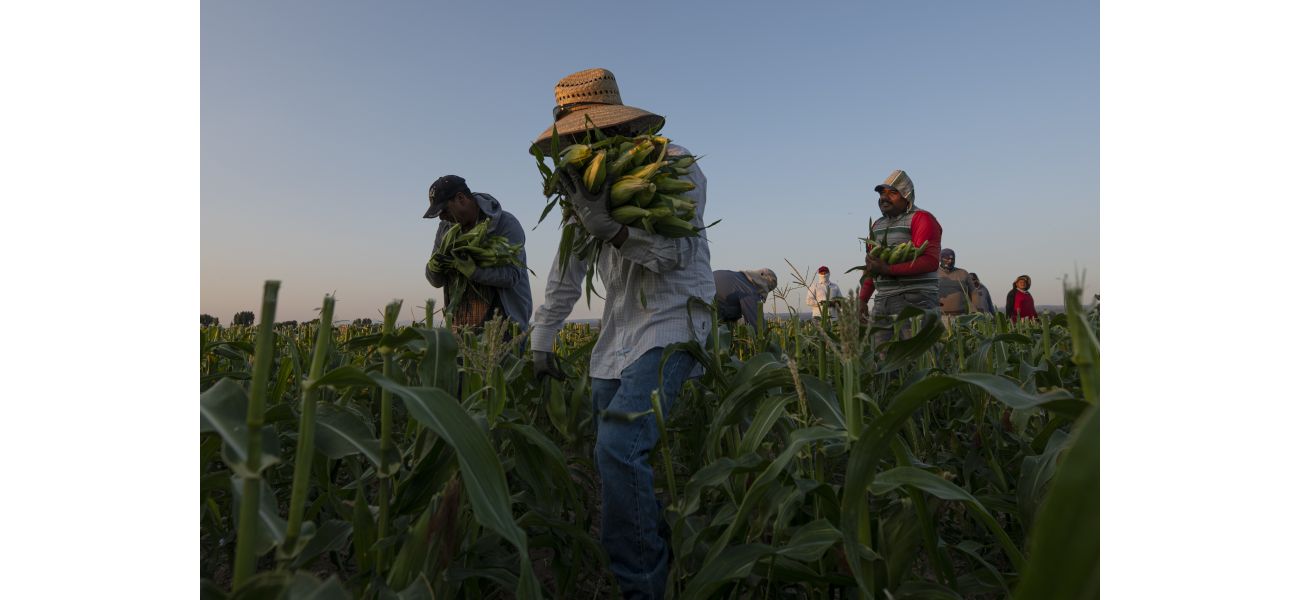Did this organization successfully stop mistreatment of farm workers? Will Colorado farmers support their efforts?
Fair Food Program fields have almost no instances of modern slavery, forced labor, physical violence or sexual assault, according to one researcher.
September 1st 2024.

Alejandro Soria has been coming to Colorado's Western Slope for eight years now and he couldn't be happier. The Mexican native has been working for the Tuxedo Corn Company, picking and sorting produce. He compares the working conditions in the United States to those in his home country and the difference is stark. Here, laborers get regular breaks and have access to water whenever they need it.
However, not all foreign workers in Colorado are as fortunate as Soria. In fact, in a three-part report by The Denver Post, it was revealed that many of these workers are being subjected to abuse and exploitation in the agricultural supply chain. Shockingly, state and federal regulators have done very little to address this issue.
Soria, on the other hand, feels like he has found a second family in Colorado. As he sorts onions destined for grocery stores across the state, he reflects on how his life has changed since coming here. He is just one of the many workers who come to the United States every year through the H-2A visa program, which allows American growers to hire seasonal employees from outside the country. This program is meant to fill the labor gap in industries where domestic workers are not available.
Unfortunately, this program has a dark side. It is known for its spotty working conditions and rampant abuse of workers. The Denver Post's investigation found that problematic employers are rarely barred from bringing in foreign workers, even when they have violated labor laws. The sheepherding industry in Colorado was found to be one of the worst offenders when it comes to human rights abuses, while wage theft remains a common problem on farms throughout the state.
But there is hope. Tuxedo Corn's employees are part of a growing movement in Colorado called the Fair Food Program. This program aims to increase accountability and worker protections throughout the food supply chain. David Harold, who runs Tuxedo Corn with his father, joined the program last year after a controversial agriculture bill was passed by the state legislature. Harold and other Colorado growers felt that they were unfairly portrayed as bad employers during the bill process, when in reality they treat their workers well.
Harold explains that he joined the Fair Food Program because he wanted a program that would back up his labor practices and where workers could endorse him as a good boss. He takes pride in doing a good job by his labor, consumers, and the community. This is especially important to him because he knows that the workers at Tuxedo Corn leave their families behind in their home countries to come and work in the United States.
So how does the Fair Food Program work? It's quite simple, really. All players in the food supply chain, including growers, buyers, and retailers, enter into legally binding agreements to adhere to certain working conditions for laborers. Participating buyers are required to stop purchasing from growers who fail to comply with the code of conduct. In return, growers who are part of the program receive purchasing preference from participating buyers and workers receive a premium on top of their wages.
For the workers, this means better working conditions, including a 24/7 complaint resolution hotline, regular Fair Food auditing, and education on their rights as workers. Derek Brinks, the associate director of the Fair Food Standards Council, expresses that this responsibility should fall on the government, but unfortunately, they have not taken enough action. This is why programs like the Fair Food Program are so important.
The Fair Food Program was born out of the struggle of farmworkers in the Florida tomato industry. These workers had been subjected to modern-day slavery, forced labor, and sexual harassment for decades. However, in 1993, a small group of workers decided to take action and their efforts led to massive wage increases and a slew of new protections for workers. Their fight also put pressure on major buyers of Florida tomatoes to only purchase from reputable growers who respected human rights. This model proved to be successful and soon other major buyers, including fast-food chains like McDonald's and Burger King, joined the program.
The Fair Food Program has since expanded to include growers in 23 states and five countries. It has also received extensive recognition and praise for its impact on worker conditions. In fact, Harvard Business Review called it one of the "most important social-impact success stories of the past century." According to Susan Marquis, a Princeton University visiting professor who authored a book about the program's origins, the Fair Food Program is "the most effective human rights program in existence right now."
The numbers speak for themselves. Since its inception in 2011, the program has received nearly 4,000 complaints from workers at participating growers, but none of these complaints have resulted in any U.S. Department of Labor cases or class-action lawsuits. Additionally, over the past six years, no growers have been suspended from the program, and over the previous five years, no growers have been put on probation for serious offenses. This is a huge feat considering the prevalence of worker abuses in the agricultural industry.
The Fair Food Program has proven to be more effective than other corporate social responsibility and multi-stakeholder initiatives, which have often been ineffective or even detrimental to workers' rights. According to Marquis, the Fair Food Program's success lies in its worker-driven approach. It is not just a PR tactic or a way for companies to appear socially responsible, but it is a genuine effort to improve the lives of farmworkers.
Gwen Cameron, a farmworker herself, explains that it is essential for workers to have a voice in their own working conditions. She wanted to put it to a vote and see if workers were satisfied with the program, and the results were overwhelmingly positive. The Fair Food Program has effectively eliminated workplace abuses in agricultural fields by harnessing the power of consumer demand and holding all players in the food supply chain accountable.
So the next time you see produce from Colorado's Western Slope, know that it was likely picked and sorted by workers who are part of the Fair Food Program, ensuring that their working conditions are fair and just.
Alejandro Soria has been working for the Tuxedo Corn Company in Colorado's Western Slope for eight years. Originally from Mexico, he is grateful for the working conditions in the United States compared to his home country. He notes the stark difference, where laborers are given regular breaks and have easy access to water whenever they are thirsty.
Unfortunately, not all foreign workers in Colorado's agricultural supply chain have the same experience. In a three-part report, The Denver Post exposes the abuses faced by these workers and the lack of action from state and federal regulators. The Post's investigation found that problematic employers are rarely barred from hiring foreign workers, even when they have violated labor laws. The sheepherding industry in Colorado was found to be one of the worst offenders of human rights, and wage theft remains a problem on farms throughout the state.
However, there is a growing movement in Colorado called the Fair Food Program that aims to increase accountability and protect workers throughout the food supply chain. The program works by having all players in the supply chain, including growers and buyers, enter legally binding agreements to adhere to certain working conditions for laborers. Participating buyers are required to stop purchasing from growers who fail to comply with the code of conduct. In return, growers receive purchasing preference and workers receive better working conditions, including access to a 24/7 complaint resolution hotline, regular audits, and education about their rights.
David Harold, who runs Tuxedo Corn with his father, joined the program last year. He explains that he felt unfairly portrayed during a divisive agriculture bill passed by the state legislature, and he wanted a program that would back up his good labor practices. Harold believes that treating his workers well is not only the right thing to do, but it also benefits his business and community.
The Fair Food Program was inspired by the Coalition of Immokalee Workers in Florida, who fought for better working conditions and wages in the tomato industry. Their efforts put pressure on major buyers like Taco Bell and McDonald's to only purchase from reputable growers who respected human rights. The program has since expanded to include growers in 23 states and five countries, earning extensive accolades and recognition for its effectiveness in eliminating workplace abuses.
According to studies, the program has significantly improved worker conditions, with virtually no incidents of modern-day slavery, forced labor, physical violence, or sexual assault reported in participating farms. Wage theft and verbal abuse have also become increasingly rare, and worker pay has increased between 60% and 100%. In comparison, other corporate social responsibility and multi-stakeholder initiatives have been largely ineffective in addressing worker abuses in global supply chains.
Gwen Cameron, a worker at the Rancho Durazno farm in Colorado, believes that the Fair Food Program has made a real difference in her life. She wanted to put it to a vote, knowing that the majority of workers would choose to continue participating in the program. With the program's success in improving worker conditions and protecting their rights, it's clear that this is a model that works and should be adopted by more companies and industries. After all, as Cameron puts it, "It leads to happier workers."
However, not all foreign workers in Colorado are as fortunate as Soria. In fact, in a three-part report by The Denver Post, it was revealed that many of these workers are being subjected to abuse and exploitation in the agricultural supply chain. Shockingly, state and federal regulators have done very little to address this issue.
Soria, on the other hand, feels like he has found a second family in Colorado. As he sorts onions destined for grocery stores across the state, he reflects on how his life has changed since coming here. He is just one of the many workers who come to the United States every year through the H-2A visa program, which allows American growers to hire seasonal employees from outside the country. This program is meant to fill the labor gap in industries where domestic workers are not available.
Unfortunately, this program has a dark side. It is known for its spotty working conditions and rampant abuse of workers. The Denver Post's investigation found that problematic employers are rarely barred from bringing in foreign workers, even when they have violated labor laws. The sheepherding industry in Colorado was found to be one of the worst offenders when it comes to human rights abuses, while wage theft remains a common problem on farms throughout the state.
But there is hope. Tuxedo Corn's employees are part of a growing movement in Colorado called the Fair Food Program. This program aims to increase accountability and worker protections throughout the food supply chain. David Harold, who runs Tuxedo Corn with his father, joined the program last year after a controversial agriculture bill was passed by the state legislature. Harold and other Colorado growers felt that they were unfairly portrayed as bad employers during the bill process, when in reality they treat their workers well.
Harold explains that he joined the Fair Food Program because he wanted a program that would back up his labor practices and where workers could endorse him as a good boss. He takes pride in doing a good job by his labor, consumers, and the community. This is especially important to him because he knows that the workers at Tuxedo Corn leave their families behind in their home countries to come and work in the United States.
So how does the Fair Food Program work? It's quite simple, really. All players in the food supply chain, including growers, buyers, and retailers, enter into legally binding agreements to adhere to certain working conditions for laborers. Participating buyers are required to stop purchasing from growers who fail to comply with the code of conduct. In return, growers who are part of the program receive purchasing preference from participating buyers and workers receive a premium on top of their wages.
For the workers, this means better working conditions, including a 24/7 complaint resolution hotline, regular Fair Food auditing, and education on their rights as workers. Derek Brinks, the associate director of the Fair Food Standards Council, expresses that this responsibility should fall on the government, but unfortunately, they have not taken enough action. This is why programs like the Fair Food Program are so important.
The Fair Food Program was born out of the struggle of farmworkers in the Florida tomato industry. These workers had been subjected to modern-day slavery, forced labor, and sexual harassment for decades. However, in 1993, a small group of workers decided to take action and their efforts led to massive wage increases and a slew of new protections for workers. Their fight also put pressure on major buyers of Florida tomatoes to only purchase from reputable growers who respected human rights. This model proved to be successful and soon other major buyers, including fast-food chains like McDonald's and Burger King, joined the program.
The Fair Food Program has since expanded to include growers in 23 states and five countries. It has also received extensive recognition and praise for its impact on worker conditions. In fact, Harvard Business Review called it one of the "most important social-impact success stories of the past century." According to Susan Marquis, a Princeton University visiting professor who authored a book about the program's origins, the Fair Food Program is "the most effective human rights program in existence right now."
The numbers speak for themselves. Since its inception in 2011, the program has received nearly 4,000 complaints from workers at participating growers, but none of these complaints have resulted in any U.S. Department of Labor cases or class-action lawsuits. Additionally, over the past six years, no growers have been suspended from the program, and over the previous five years, no growers have been put on probation for serious offenses. This is a huge feat considering the prevalence of worker abuses in the agricultural industry.
The Fair Food Program has proven to be more effective than other corporate social responsibility and multi-stakeholder initiatives, which have often been ineffective or even detrimental to workers' rights. According to Marquis, the Fair Food Program's success lies in its worker-driven approach. It is not just a PR tactic or a way for companies to appear socially responsible, but it is a genuine effort to improve the lives of farmworkers.
Gwen Cameron, a farmworker herself, explains that it is essential for workers to have a voice in their own working conditions. She wanted to put it to a vote and see if workers were satisfied with the program, and the results were overwhelmingly positive. The Fair Food Program has effectively eliminated workplace abuses in agricultural fields by harnessing the power of consumer demand and holding all players in the food supply chain accountable.
So the next time you see produce from Colorado's Western Slope, know that it was likely picked and sorted by workers who are part of the Fair Food Program, ensuring that their working conditions are fair and just.
Alejandro Soria has been working for the Tuxedo Corn Company in Colorado's Western Slope for eight years. Originally from Mexico, he is grateful for the working conditions in the United States compared to his home country. He notes the stark difference, where laborers are given regular breaks and have easy access to water whenever they are thirsty.
Unfortunately, not all foreign workers in Colorado's agricultural supply chain have the same experience. In a three-part report, The Denver Post exposes the abuses faced by these workers and the lack of action from state and federal regulators. The Post's investigation found that problematic employers are rarely barred from hiring foreign workers, even when they have violated labor laws. The sheepherding industry in Colorado was found to be one of the worst offenders of human rights, and wage theft remains a problem on farms throughout the state.
However, there is a growing movement in Colorado called the Fair Food Program that aims to increase accountability and protect workers throughout the food supply chain. The program works by having all players in the supply chain, including growers and buyers, enter legally binding agreements to adhere to certain working conditions for laborers. Participating buyers are required to stop purchasing from growers who fail to comply with the code of conduct. In return, growers receive purchasing preference and workers receive better working conditions, including access to a 24/7 complaint resolution hotline, regular audits, and education about their rights.
David Harold, who runs Tuxedo Corn with his father, joined the program last year. He explains that he felt unfairly portrayed during a divisive agriculture bill passed by the state legislature, and he wanted a program that would back up his good labor practices. Harold believes that treating his workers well is not only the right thing to do, but it also benefits his business and community.
The Fair Food Program was inspired by the Coalition of Immokalee Workers in Florida, who fought for better working conditions and wages in the tomato industry. Their efforts put pressure on major buyers like Taco Bell and McDonald's to only purchase from reputable growers who respected human rights. The program has since expanded to include growers in 23 states and five countries, earning extensive accolades and recognition for its effectiveness in eliminating workplace abuses.
According to studies, the program has significantly improved worker conditions, with virtually no incidents of modern-day slavery, forced labor, physical violence, or sexual assault reported in participating farms. Wage theft and verbal abuse have also become increasingly rare, and worker pay has increased between 60% and 100%. In comparison, other corporate social responsibility and multi-stakeholder initiatives have been largely ineffective in addressing worker abuses in global supply chains.
Gwen Cameron, a worker at the Rancho Durazno farm in Colorado, believes that the Fair Food Program has made a real difference in her life. She wanted to put it to a vote, knowing that the majority of workers would choose to continue participating in the program. With the program's success in improving worker conditions and protecting their rights, it's clear that this is a model that works and should be adopted by more companies and industries. After all, as Cameron puts it, "It leads to happier workers."
[This article has been trending online recently and has been generated with AI. Your feed is customized.]
[Generative AI is experimental.]
0
0
Submit Comment





